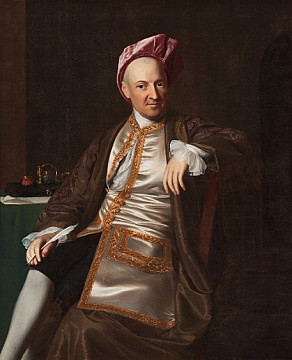Thomas Boylston (1721-1798)
Merchant of Boston & London; died unmarried
He was a "very eminent" merchant at Boston and in 1766 was described by his famous cousin John Adams: "Tom is a firebrand. Tom is a perfect viper, a Jew, a devil, but is orthodox in politics, however". He was a Loyalist and among those who were detained by General Gage in consequence of the imprisonment of Jones and Hicks at Concord. He was released on exchange in 1775 and two years later was famously humiliated by the womenfolk of Boston after he had tried to drive up the price of coffee and sugar by keeping them off the market as many went hungry. He then moved to London where he invested his fortune in the merchant bank of Lane, Son & Fraser but was "utterly ruined" after the firm collapsed owing over a million pounds.
In 1793, Matthias Aspden, another Loyalist, recounted: "I called to see, in Newgate, Mr. Thomas Boylston, of Boston, whom they want to bring in as a sleeping partner in the House of Lane, Son & Fraser, lately failed; or, if this won't do, to milk him for lending them money (£40,000) at usurious interest. So much for being a stranger and friendless". Tom died "of a broken heart" in 1798 when he was living in the Parish of St. Martin's Vintry, London. Having once been the richest man in Colonial New England with $400,000, he left what remained to the Town of Boston, but by the time it had been dragged through the courts very little, if any, of the fortune ever benefitted his birthplace.
In 1793, Matthias Aspden, another Loyalist, recounted: "I called to see, in Newgate, Mr. Thomas Boylston, of Boston, whom they want to bring in as a sleeping partner in the House of Lane, Son & Fraser, lately failed; or, if this won't do, to milk him for lending them money (£40,000) at usurious interest. So much for being a stranger and friendless". Tom died "of a broken heart" in 1798 when he was living in the Parish of St. Martin's Vintry, London. Having once been the richest man in Colonial New England with $400,000, he left what remained to the Town of Boston, but by the time it had been dragged through the courts very little, if any, of the fortune ever benefitted his birthplace.



